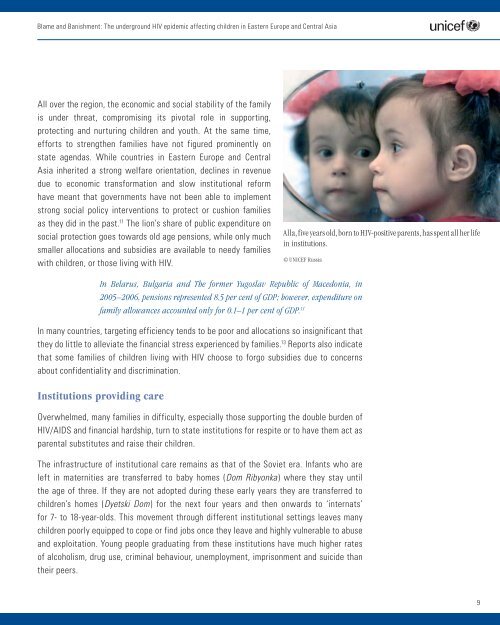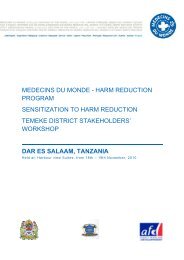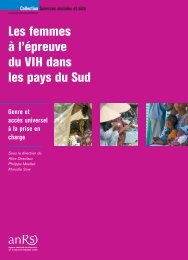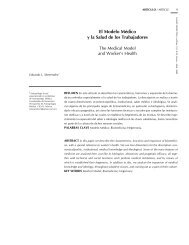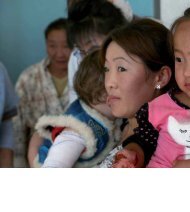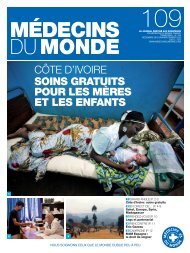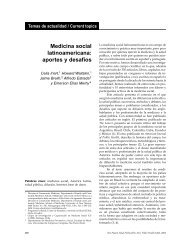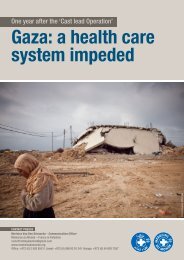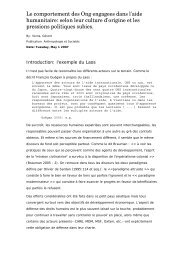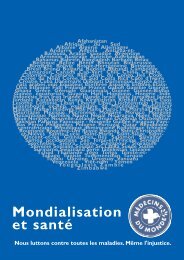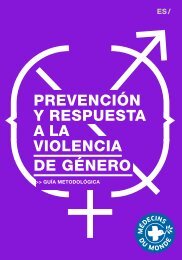Blame & Banishment - Médecins du Monde
Blame & Banishment - Médecins du Monde
Blame & Banishment - Médecins du Monde
You also want an ePaper? Increase the reach of your titles
YUMPU automatically turns print PDFs into web optimized ePapers that Google loves.
<strong>Blame</strong> and <strong>Banishment</strong>: The underground HIV epidemic affecting children in Eastern Europe and Central Asia<br />
All over the region, the economic and social stability of the family<br />
is under threat, compromising its pivotal role in supporting,<br />
protecting and nurturing children and youth. At the same time,<br />
efforts to strengthen families have not figured prominently on<br />
state agendas. While countries in Eastern Europe and Central<br />
Asia inherited a strong welfare orientation, declines in revenue<br />
<strong>du</strong>e to economic transformation and slow institutional reform<br />
have meant that governments have not been able to implement<br />
strong social policy interventions to protect or cushion families<br />
as they did in the past. 11 The lion’s share of public expenditure on<br />
social protection goes towards old age pensions, while only much<br />
smaller allocations and subsidies are available to needy families<br />
with children, or those living with HIV.<br />
Alla, five years old, born to HIV-positive parents, has spent all her life<br />
in institutions.<br />
© UNICEF Russia<br />
In Belarus, Bulgaria and The former Yugoslav Republic of Macedonia, in<br />
2005–2006, pensions represented 8.5 per cent of GDP; however, expenditure on<br />
family allowances accounted only for 0.1–1 per cent of GDP. 11<br />
In many countries, targeting efficiency tends to be poor and allocations so insignificant that<br />
they do little to alleviate the financial stress experienced by families. 13 Reports also indicate<br />
that some families of children living with HIV choose to forgo subsidies <strong>du</strong>e to concerns<br />
about confidentiality and discrimination.<br />
Institutions providing care<br />
Overwhelmed, many families in difficulty, especially those supporting the double burden of<br />
HIV/AIDS and financial hardship, turn to state institutions for respite or to have them act as<br />
parental substitutes and raise their children.<br />
The infrastructure of institutional care remains as that of the Soviet era. Infants who are<br />
left in maternities are transferred to baby homes (Dom Ribyonka) where they stay until<br />
the age of three. If they are not adopted <strong>du</strong>ring these early years they are transferred to<br />
children’s homes (Dyetski Dom) for the next four years and then onwards to ‘internats’<br />
for 7- to 18-year-olds. This movement through different institutional settings leaves many<br />
children poorly equipped to cope or find jobs once they leave and highly vulnerable to abuse<br />
and exploitation. Young people gra<strong>du</strong>ating from these institutions have much higher rates<br />
of alcoholism, drug use, criminal behaviour, unemployment, imprisonment and suicide than<br />
their peers.<br />
9


